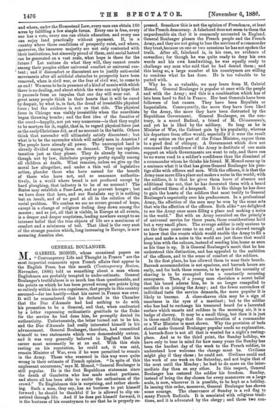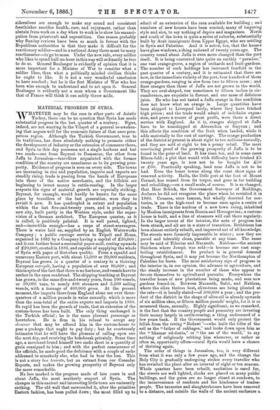GENERAL BOULANGER.
MG A.13RIEL MONOD, whose occasional papers on • " Contemporary Life and Thought in France " are the moat impartial comments upon French affairs that appear in the English Press, has this month (Contemporary Review, November, 1886) told us something about a man whom Englishmen are probably tempted to under-estimate. General Boulanger's truthfulness is so much less than questionable, and the points on which he has been proved wrong are points lying so entirely within his own cognisance, that people in this country assumed—far too hastily—that his career in France was over. It will be remembered that he declared in the Chamber that the Due d'Aumale had had nothing to do with his promotion to be a General, and that, when confronted by a letter expressing enthusiastic gratitude to the Duke for the service he had done him, he promptly denied its authenticity. Unfortunately, the letter turned out to be his, and the Duc d'Aumale had really interested himself in his advancement. General Boulanger, therefore, had committed himself to two statements which were demonstrably untrue, and it was very generally believed in England that his career must necessarily be at an end. With this stain resting on his reputation, he could not, it was said, remain Minister of War, even if he were permitted to remain in the Army. Those who reasoned in this way were quite wrong in their estimate of French opinion. " In spite of this unpleasant occurrence," says M. Monod, " General Boulanger is still popular. He is the first Republican statesman since the death of Gambetta who has made ardent partisans, and above all has been able to excite the enthusiasm of the crowd." To Englishmen this is surprising, and rather shock- ing. Such a man, they say, has no business to put himself forward ; he should be thankful if he is allowed to slip un- noticed through life. And if he does put himself forward, it is the business of his countrymen to see that he is properly re-
pressed. Somehow this is not the opinion of Frenchmen, at least of the French democracy. A falsehood does not seem to them the unpardonable sin that it is commonly accounted in England. General Boulanger pleases the French people and the French Army, and they are not going to lose the services of a commander they trust, because on one or two occasions he has not spoken the truth. After all, falsehood is, in his case, no evidence of cowardice; for though he was quite ready to deny his own words and his own handwriting, he was equally ready to challenge any man who said that he had denied them ; and this being so, a large number of his countrymen are willing to condone what he has done. He is too valuable to be parted with.
Why he is so valuable, we may learn from M. Gabriel Monod. General Boulanger is popular at once with the people and with the Army ; and this is a combination which has of late been hard to find in France. Her best Generals have been followers of lost causes. They have been Royalists or Imperialists. Consequently, the more they have been liked by the Army, the more they have been distrusted by the Republican Government. General Boulanger, on the con- trary, is a sound Radical, a friend of M. Cl6menceau's, and yet he is liked by the soldiery. So long as he is Minister of War, the Cabinet gain by his popularity, whereas his departure from office would, especially if it were the result of any action on the part of the Prime Minister, expose theca to a good deal of obloquy. A Government which does not command the confidence of the Army is destitute of one main support on which Governments are wont to rely, and there can be no worse road to a soldier's confidence than the dismissal of a commander whom he thinks his friend. M. Monod sums up in a sentence what it is that has given General Boulanger his pres- tige alike with officers and men. With the officers, it is that the Army once more fills a place and makes a noise in the world; with the soldiers, it is that he gives them leave of absence and additional time out, that he has decorated them with a beard and relieved them of a knapsack. It is the things he has done to gain the hearts of the soldiers that most testify to General Boulanger's superiority over his predecessors. In a professional Army, the affection of the men may be won by the same arts that win the affection of the officers. Both alike " are delighted to see the Army once more filling a place and making a noise in the world." But with an Army recruited on the princip'e of universal service for three years, these considerations hold but a very small place. The average soldier is only anxious to see the three years come to an end ; and he is shrewd enough to know that the events which would enable the Army to fill a place and make a noise in the world are just those that would keep him with the colours, instead of sending him home as soon as his time is up. It is General Boulanger's merit that he has understood this distinction, and has appealed to the ambition of the officers, and to the sense of comfort of the soldiers.
In the first place, he has allowed them to wear their beards. Barrack accommodation is not spacious, and barrack hours are early, and for both these reasons, to be spared the necessity of shaving is to be exempted from a constantly recurring annoyance. Then, if a young man cherishes a secret belief that his beard adorns him, he is no longer compelled to sacrifice it on joining the Army ; and the fewer surrenders of individual taste the service demands, the more popular it is likely to become. A close-shaven chin may be a sign of smartness in the eyes of a martinet ; but to the soldier who has had to exchange his treasured beard for a lacerated surface which smarts and reddens in the morning air, it is a badge of slavery. It may be a small thing, but then it is just in these small things that the consideration of a commander or a War Minister is most shown. Why the provision of beds should make General Boulanger popular needs no explanation. A barrack-floor is not all that is wanted for a night's resting- place. And as to the third point, the Sunday holiday, we have only to bear in mind for how many years the Sunday has been the hardest day of the week to the French soldier, to understand how welcome the change must be. Civilians might play if they chose ; he could not. Civilians could end the work of one week on the Saturday, and not begin that of the next until the Monday ; he had to do more on the inter- mediate day than on any other. In this respect, General Boulanger has restored the soldier his freedom. Sunday, instead of being the day chosen for every manoeuvre on a large scale, is now, wherever it is possible, to be kept as a holiday. In issuing this order, moreover, General Boulanger has shown some courage. The observance of Sunday is a red flag to many French Radicals. It is associated with religious tradi- tions, and it is advocated by the clergy ; and these two con- siderations are enough to make any sound and consistent freethinker sacrifice health, ease, and enjoyment, rather than abstain from work on a day when to work is to show his emanci- pation from priestcraft and superstition. One reason probably why Sunday reviews have been so much in favour with the Republican authorities is that they make it difficult for the reactionary soldier—and in a national Army there must be many reactionaries—t&go to mass. Under the new rule, every soldier who likes to spend half-an-hour in this way will ordinarily be free to do so. General Boulanger is evidently of opinion that it is more important for a Minister of War to consider what a soldier likes, than what a politically minded civilian thinks he ought to like. It is not a very wonderful conclusion to have reached ; but he is the first Minister of War who has been wise enough to understand and to act upon it. General Boulanger is evidently not a man whom a Government like that of France will think it can safely throw aside.















































 Previous page
Previous page